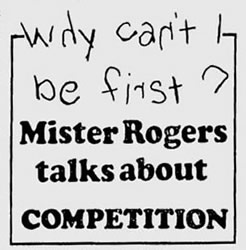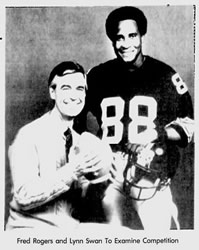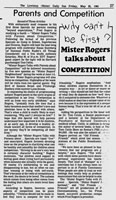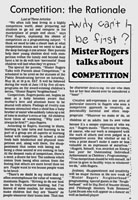Why Can't I Be First?
Publication: The Lewiston Daily Sun (Lewiston, Maine)
Author: Unknown
Date: May 26, 1981; May 29, 1981; May 30, 1981





(click images for larger view)
A LOOK AT COMPETITION
Does being "first" mean we are a better person or being a "winner" make us more loveable? These questions, often asked by young and old, become the subject of an all-new week of programs on "Mister Robers' [sic] Neighborhood" when Fred Rogers takes on the topic of Competition June 1-5 at 5 PM EST on PBS. A one-hour parents' Special "Mister Rogers Talks with Parents about Competition" will precede the children's week Saturday, May 30 at 10 PM EST (Please check local schedules for exact air times).
"At the deepest roots of competition there's a need and desire for love," Rogers maintains. "The sadness which comes from losing often comes from the feeling that others are more loved than we are. In simplest terms, people want to win because they want to be loved." Competition, Rogers points out, begins as soon as a baby becomes aware that a mother's love and attention have to be shared with others.
Early feelings of rivalry can become particularly intense when a child has a baby brother or sister who suddenly takes up a lot of time in mother's arms or lap. "That's when a child is really likely to start wondering, 'Why can't I always be first?'" says Rogers. "And it's the beginning of a difficult, life-long lesson."
In a first-time collaboration of two of Public Television's most popular children's programs, Mister Rogers makes a visit to Sesame Street May 22nd and Big Bird comes to "Mister Rogers' Neighborhood." Big Bird's arrival in the Neighborhood of Make-Believe introduces the subject of jealousy in the new week of Competition programs. "Often we adults talk as if it's a bad thing to feel jealous. But jealousy can be a natural consequence of loving someone. We may sometimes handle our jealous feelings in inappropriate ways, but it's certainly natural to have those feelings. In our make-believe segment, we'll be trying to help children understand that just because our 'best friend' likes someone else, too, it doesn't mean that our friend likes us any the less. For young children, affection should not become something that is won or lost in competition with others."
Also highlighting the children's week of programming will be Pittsburgh Steelers Wide Receiver Lynn Swann. One of professional football's all-time greats, Swann is also a serious and gifted dancer. He will be seen working out with members of a ballet company as well as performing on the gridiron. "Lynn Swann is someone who really knows about fierce competition," says Rogers. "He knows the exhilaration of winning and he knows the disappointment of losing. But most important of all, he knows a lot about trying hard. As a dancer, he has also learned the joy of creative self expression. That's something I'd like to help every child find in his or her own way. Whatever we do and however we do it, we give it a unique value as the expression of a unique human being."
To be broadcast immediately preceding the new week on "Mister Rogers' Neighborhood" is the fourth in a series of national specials for parents -- "Mister Rogers Talks with Parents about Competition." This hour-long, studio-audience program will give parents the chance to ask Rogers and Harvard psychologist Tom Cottle about the subject their children will be watching the following week. According to Rogers, how parents help their young children deal with competition may have a lot to do with how successful those children will feel when they're middle-aged and older.
PARENTS AND COMPETITION
With enthusiastic mail response to his first three Specials for parents running "beyond expectations," Fred Rogers is readying a fourth -- "Mister Rogers Talks with Parents about Competition." Following the format of the previous Specials on Going to School, Superheroes and Divorce, Rogers will host the hour-long program with moderator Susan Stamberg (of National Public Radio's All Things Considered) and a live studio audience Saturday, May 30, at 10 p.m. EDT. Rogers' guest expert for the topic will be Harvard psychologist Tom Cottle.
"Mister Rogers Talks with Parents about Competition" will be followed immediately by five new episodes of "Mister Rogers' Neighborhood" during the week of June 1-5. The new Mister Rogers programs will also focus on competition. Highlights of the week will be visits from two special guests: Big Bird of Sesame Street and Pittsburgh Steelers wide receiver Lynn Swann.
In explaining his choice of programming subject Rogers points to the early origins of competition in our lives. "Competition is with us from very early childhood," says Rogers, "probably from the time that a baby becomes aware that mother's love and attention have to be shared with others. That's when a child is really likely to start wondering, 'Why can't I always be first?' I hope that this Special will help parents understand how important it is for children, at an early age, to develop a healthy attitude toward all forms of competition. In our society they'll be competing all their lives."
Although the "Mister Rogers Talks with Parents about..." Specials are taped "live" and unscripted, Rogers foresees devoting time on the program to clarifying what can be healthy and unhealthy for children about competition. "Striving to do one's very best is certainly character building," Rogers maintains, "but children need support in feeling good about trying hard particularly when someone else actually wins the game. Of course it's exhilarating to win and disappointing to lose, but so often we confuse winning or losing with self-worth. That's because at the roots of competition is the need, the desire to be loved. The sadness which comes from losing often comes from the feeling that others are more loved than we are."
According to Rogers, however, some aspects of competition can be plain unhealthy. "Children should not be made to feel they have to compete for love or friendship," Rogers emphasizes. "And when children express themselves in a creative way -- in art or dance or music or writing -- they should not feel that the value of what they do depends on how 'well' they do it compared to someone else. Whatever a child makes or does has a unique value of its own because it is the expression of a unique human being. That's true for all of us at all ages."
Adding his perspectives to the issue will be Dr. Tom Cottle, a Boston psychologist and a lecturer at the Department of Psychiatry of Harvard University's medical school. Cottle, in addition to being the author of several books, is host of The Tom Cottle Show on Boston's PBS Station WGBH. (He was also the subject of a Fred Rogers portrait on "Old Friends, New Friends" which aired last season on the stations of the Public Broadcasting Service.)
"We have been so pleased to hear from viewers that our programs are ___ helpful," says Rogers. "The willingness with which some parents have shared their personal experiences has touched us deeply. That kind of 'dialogue' is ____ television but it has always been very important to us at Family Communications. When people are able to trust us with their feelings they really help us produce communications that can be helpful to others."
The "Mister Rogers Talks with Parents about..." Specials, "Mister Rogers' Neighborhood," and "Old Friends, New Friends" are all productions of Family Communications, Inc., the Pittsburgh, non-profit production company of which Fred Rogers is president.
COMPETITION: THE RATIONALE
"We often talk about living in a highly competitive world, about preparing our children to go out and compete in the marketplace of people and ideas," says Fred Rogers, explaining his choice of competition as a programming subject. "I think we need to take a closer look at what competition means and we need to look at the deep feelings it can arouse. How parents help their young children deal with competition within the family and beyond may have a lot to do with how 'successful' those children will feel when they're grown."
The special for parents, "Mister Rogers Talks with Parents about Competition," is schedule to be aired on the stations of the Public Broadcasting Service on Saturday, May 30, at 10 p.m. EST. It will be followed during the week of June 1-5 by five all-new programs on the award-winning children's series, "Mister Rogers' Neighborhood."
Competition, Rogers points out, begins as soon as a baby becomes aware that mother's love and attention have to be shared with others. Feelings of rivalry can become intensified when a child has a baby brother or sister who suddenly takes up a lot of time in mother's arms or lap. All children have times of wondering, 'Why can't I always be first?'", says Rogers.
According to Rogers, learning to share, learning to take turns and learning to be part of a group are all aspects of learning to deal with competition. In school a child finds both intellectual and physical competition and, along with them, the disappointment that comes with losing out, being a close second or even coming in last. At the deepest roots of competition, there's a need, a desire for love. The sadness which comes from losing often comes from the feeling that others are more loved than we are. People want to win because people want to be loved.
"There's no doubt in my mind that we often overemphasize the value of winning," maintains Rogers. "Striving to do our best can be truly character building, but I've known of some coaches, for instance, who make children feel they are 'losers' as people whenever their teams lose. That can be character destroying. No one who does his or her best should ever be considered a 'loser.'"
Creative self-expression is one area of particular concern to Rogers who sees a competitive approach to creativity as potentially harmful and often inappropriate. "Whatever we make or do, as children or as adults, has its own value because it's a unique expression of who we are," Rogers insists. "There may be times, of course, when our work is compared with the work of others and even judged in a competitive arena. But whether or not it wins a prize doesn't make it more or less valuable as an expression of ourselves." Rogers himself, was awarded an Emmy last year for Outstanding Individual Achievement in Children's Programming. "True competition should be with oneself, to strive to grow in healthy ways in whatever we do," adds Rogers.
Jealousy, disappointment and creativity will be major themes in the new week of "Mister Rogers' Neighborhood" programming. Special guests in the "Neighborhood" will be Big Bird of Sesame Street and Pittsburgh Steelers Wide Receiver Lynn Swann who will appear as a dancer as well as football player.
